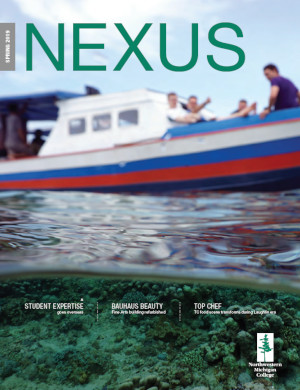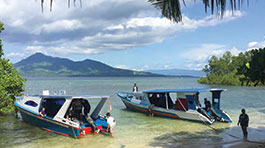
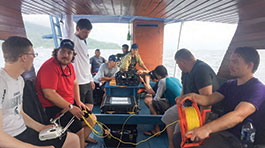
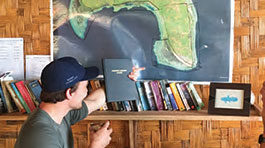
Read other stories from the Spring 2019 issue:
READ THE ISSUE IN YOUR BROWSER »
Want to be added to the Nexus mailing list? Email your name and address to foundation@nmc.edu, or call (877) 922-1021 or (231) 995-1021.
Student Expertise Goes Overseas
Indonesian institute enlists NMC for coral reef study
Marine tech, drones, water studies integrated in mapping project
Nexus Spring 2019 Cover Feature
Hiking through dense tropical jungle on an Indonesian island last May, NMC student Ryan Mater thought longingly of a project he and his marine technology classmates had left unfinished in a college classroom.
It was a hybrid drone, capable of taking off from and landing on water, and then dropping a submersible payload, like a camera. It would have been ideal for the work that had brought Mater and 11 fellow students to Indonesia: Conducting a study on the health of the coral reef system in a national park by integrating their expertise in marine technology, aerial mapping, water quality testing and data collection.
But the classroom was 9,000 miles, 34 hours of travel and three customs inspections away. When they’d chosen their equipment, they’d decided the hybrid was too bulky and too untested to justify shipping. Now Mater and the rest of the NMC team would have to find another way to tackle the task, one they had only a week to complete.
“We had to alter our game plan,” said Mater, 20, who led the group's Unmanned Aerial Systems unit.
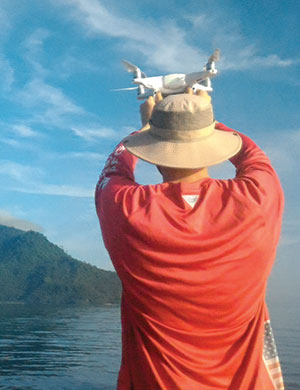 Ryan Mater prepares to launch an NMC drone in Indonesia's Bunaken National ParkIt would become a mantra for the mission to Bunaken Island, an endeavor more than a year in the making and which exemplifies NMC s strategic agenda to establish national and international competencies, offer students global opportunities and build collaborative relationships with other institutions.
Ryan Mater prepares to launch an NMC drone in Indonesia's Bunaken National ParkIt would become a mantra for the mission to Bunaken Island, an endeavor more than a year in the making and which exemplifies NMC s strategic agenda to establish national and international competencies, offer students global opportunities and build collaborative relationships with other institutions.
“We spent four or five months studying the island. Nothing really prepares you for when you show up,” said marine technology student Clayton Harbin, 25, lead underwater technician.
The unique conditions of exactly where they showed up forced much of the adaptation. Politeknik Negeri Manado, a technical institute in Indonesia, was NMC’s partner in the project. Manado is just 1.6 degrees north of the equator. For perspective, that’s further south of Miami than Traverse City is north.
Tropical heat and humidity are electronics enemy No. 1, and even without the hybrid, NMC brought plenty. Drones and underwater ROVs and laptops were all needed to conduct the survey and to train their Indonesian counterparts. The idea hatched at a 2017 conference in Jakarta, the Indonesian capital, where NMC Technical Division Director Ed Bailey met a colleague from Politeknik Negeri. Exploring ways they might work together, the coral reef study was conceived as an interdisciplinary capstone project for students in three NMC niches: marine technology, unmanned aerial systems and water studies.
“There’s very little baseline information on some of their ecosystems,” Bailey said. “Our role was to be the technical support for the work (Politeknik Negeri) does and the lead researcher does.”
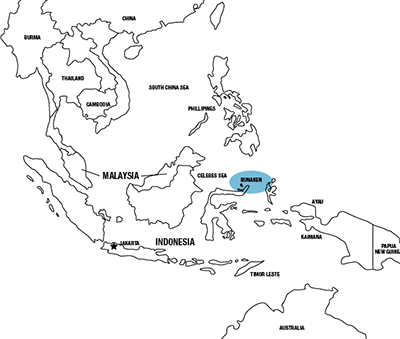 Being sought out for such expertise validates NMC s strategy to cultivate the three niches over the last decade, which has already attracted students from outside the college's traditional service area, like Harbin from San Diego and Mater from Kalamazoo. It also meant the project offered students international work experience, “invaluable” to the students, said Marguerite Cotto, NMC vice president for lifelong and professional learning.
Being sought out for such expertise validates NMC s strategy to cultivate the three niches over the last decade, which has already attracted students from outside the college's traditional service area, like Harbin from San Diego and Mater from Kalamazoo. It also meant the project offered students international work experience, “invaluable” to the students, said Marguerite Cotto, NMC vice president for lifelong and professional learning.
But they had to earn it, with a capital E.
Harbin pulled an all-nighter the first night, cannibalizing one ROV for parts to fix another after components failed. His “MacGyvered” repair had the side effect of creating steering deficiencies. To compensate, Harbin refined a drift dive technique, relying on underwater currents to propel the ROV. That in turn offered the bonus side effect of conserving the unit’s battery. The underwater team dropped the ROV 150 times at 19 sites around the island, gathering images and video from deep and shallow water.
“I learned more about those (ROV) vehicles in Indonesia than the last two years,” Harbin said. “It really did push everyone.”
Conditions meant Mater’s UAS team also had only one usable unit. Bushwhacking through the mangroves to get to beaches, they were able to launch just four drone fights the first two days. They had covered only a quarter mile of the reef. Time was ticking away on the mission clock.
“That third morning, we got a boat.” Mater snapped his fingers and smiled as he recalled the game changer. It meant standing in the boats, literally launching and catching the drone by hand (further substantiating that the project back at Parsons-Stulen had real potential). But flights per day quadrupled. They went from one-quarter mile of reef data to 13 miles.
“Finding a routine with the sun, the wind and the boat was where the UAS crew clicked,” Mater said. “We basically invented that method.”
A third team was crunching all the numbers. Data management lead Renate Schmidt, 26, processed 250 gigabytes of aerial and underwater data to generate a final report to help guide Indonesia as it seeks to balance the environmental health of the coral reef with its economic value as a tourist magnet.
“That’s their entire livelihood on that island,” Mater said.
“If the coral reef dies, the tourism in that region dies,” Bailey said, noting that northern Michigan faces similar calculations, making the Indonesian experience locally relevant. “We have the same issues going on. There’s a really big correlation.”
In addition to the constant problem-solving and troubleshooting, the NMC students trained Indonesia students studying engineering and marine ecotourism to use the NMC equipment.
“We made really beautiful connections with the people,” Harbin said.
“I have never felt that much stress,” Mater said. “I sat on the beach, watched the sun come up every morning, and that was my de-stressing time.”
While the mission lasted only a week, word about it spread quickly. On the last night, they were invited to dinner at the major general’s palace. The appreciation took students by surprise but validated the sweat and stress of the experience.
“We were like rock stars over there,” Harbin said. “We left with such a huge impact.”
The NMC survey report and any action it may prompt now rests with Politeknik Negeri in Indonesia. NMC is planning a return trip this year.
Mailing List Change Requests
To be added to or removed from NMC mailing lists for print publications like Nexus, or to update your mailing address, please send an email with your name, address and request to foundation@nmc.edu, or call (877) 922-1021 or (231) 995-1021.
